
JOURNAL OF RADIOANALYTICAL AND NUCLEAR CHEMISTRY
Scope & Guideline
Shaping the landscape of radiochemical innovation.
Introduction
Aims and Scopes
- Radioanalytical Techniques:
The journal emphasizes the development and application of various radioanalytical techniques, including gamma spectrometry, liquid scintillation counting, neutron activation analysis (NAA), and mass spectrometry for the detection and quantification of radionuclides in environmental and biological samples. - Environmental Radioactivity:
Research on the natural and anthropogenic sources of radioactivity in the environment, including the study of radionuclide distribution, transport mechanisms, and the associated health risks, is a core focus area. - Nuclear Forensics and Safeguards:
The journal covers advancements in nuclear forensics, including the analysis of nuclear materials and the development of methodologies for the detection and characterization of illicit nuclear materials. - Radiopharmaceutical Development:
Papers on the development, synthesis, and application of radiopharmaceuticals for medical imaging and therapy are prevalent, reflecting the journal's commitment to the intersection of nuclear chemistry and healthcare. - Waste Management and Recycling:
The journal explores methodologies for the treatment, recycling, and safe disposal of radioactive waste, highlighting innovative approaches to mitigate environmental impacts. - Fundamental Research in Radiochemistry:
Theoretical and experimental studies that advance the fundamental understanding of radiochemical processes, including the behavior of actinides and fission products in various matrices, are essential contributions to the journal.
Trending and Emerging
- Advanced Materials for Radionuclide Removal:
There is a growing emphasis on the development of novel materials, such as functionalized nanomaterials and composites, for the efficient removal of radionuclides from wastewater and contaminated environments. This trend highlights the integration of materials science with radiochemistry. - Health Impact Studies:
Research focusing on the health impacts of radionuclides, including the assessment of exposure risks from sources like groundwater and environmental contaminants, is increasingly prominent. This reflects a broader societal concern regarding public health and environmental safety. - Machine Learning and Data Analysis in Nuclear Research:
The incorporation of machine learning and advanced data analysis techniques in nuclear research is on the rise, with studies utilizing these methods for predictive modeling and optimization of radionuclide separation processes. - Sustainable Practices in Nuclear Chemistry:
Emerging themes include sustainability in nuclear chemistry, focusing on eco-friendly methods for radionuclide extraction, waste management, and the use of biodegradable materials in radiochemical applications. - Interdisciplinary Approaches to Nuclear Forensics:
Increasingly, research is integrating concepts from various scientific disciplines to enhance nuclear forensics methodologies, reflecting a trend towards comprehensive approaches in safeguarding and nuclear security.
Declining or Waning
- Traditional Radiochemical Methods:
There has been a decline in studies focused solely on traditional radiochemical methods that do not incorporate new technologies or interdisciplinary approaches. As research evolves, there is a growing preference for methodologies that integrate advanced analytical techniques or novel materials. - Basic Radiochemical Studies:
Research that primarily focuses on basic radiochemical properties without application to real-world problems, particularly in environmental and health contexts, appears to be waning. The trend suggests a shift towards applied research with practical implications. - Conventional Waste Management Techniques:
Papers centered around conventional waste management techniques are becoming less common, as the field moves towards more innovative and sustainable solutions that incorporate advanced materials and methodologies.
Similar Journals
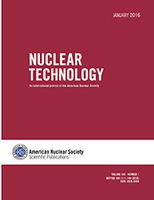
NUCLEAR TECHNOLOGY
Empowering Innovation in Nuclear EngineeringNUCLEAR TECHNOLOGY is a leading academic journal published by TAYLOR & FRANCIS INC, dedicated to the expansive field of nuclear science and engineering. With a robust ISSN of 0029-5450 and an E-ISSN of 1943-7471, this journal provides invaluable insights and cutting-edge research from 1971 to 2024. Positioned in the esteemed Q2 category for Condensed Matter Physics, Nuclear and High Energy Physics, and Nuclear Energy and Engineering, it boasts respectable Scopus rankings, underscoring its impact and relevance within the academic community. NUCLEAR TECHNOLOGY serves as a crucial platform for researchers, professionals, and students, fostering an exchange of knowledge that advances the understanding and application of nuclear technologies. While it operates on a subscription model, this journal remains a vital resource for those aiming to contribute to or stay at the forefront of developments in nuclear technology.

Separation Science Plus
Unveiling cutting-edge techniques in separation science.Separation Science Plus is an emerging academic journal dedicated to advancing the field of analytical chemistry and separation science. Published by WILEY-VCH Verlag GmbH, this journal provides a platform for researchers to disseminate high-quality studies and reviews that address innovative techniques and breakthroughs in separation methodologies. With its ISSN 2573-1815, the journal has made significant inroads since its inception in 2018, encompassing a convergence period until 2024. Despite currently holding a Q3 ranking in Analytical Chemistry and a Q4 ranking in Filtration and Separation, its dedication to publishing impactful research makes it a vital resource for professionals and students alike. The journal operates under the robust scholarly reputation of WILEY, which is known for its commitment to excellence in scientific communication. Researchers interested in the latest advancements in separation techniques will find Separation Science Plus an essential read, fostering the exchange of knowledge and facilitating greater understanding within this specialized field.

EJNMMI Radiopharmacy and Chemistry
Advancing the frontiers of radiopharmacy and nuclear medicine.EJNMMI Radiopharmacy and Chemistry, published by SpringerNature, stands at the forefront of research in the critical fields of radiopharmacy and nuclear medicine. With an impressive impact factor and a dedicated Open Access policy since 2016, this journal invites the global scientific community to share advancements in the synthesis, development, and application of radiopharmaceuticals within the realm of analytical chemistry and pharmacology. As evidenced by its notable categorizations, including Q1 in Analytical Chemistry and Radiology, Nuclear Medicine and Imaging, along with high Scopus rankings, EJNMMI offers a prestigious platform for rigorous peer-reviewed research that informs and inspires progress in medical imaging and therapeutics. The journal's commitment to accessibility fosters collaboration and innovation, making it an essential resource for researchers, medical professionals, and students seeking to advance their understanding and application of radiopharmaceuticals.
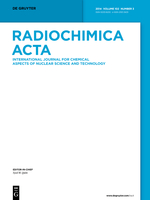
RADIOCHIMICA ACTA
Pioneering Research in Radioch Chemistry Since 1962RADIOCHIMICA ACTA, published by Walter de Gruyter GmbH, is a leading journal in the field of Physical and Theoretical Chemistry, with a storied history dating back to 1962. Based in Berlin, Germany, this esteemed journal serves as a vital platform for researchers, professionals, and students interested in the intricate interactions between radioactivity and chemical processes. With an impressive *Scopus rank* of 125 out of 189 and a *Category Quartile* ranking of Q3 for 2023, it is recognized for contributing significant findings to the scientific community. Although it currently does not provide open access options, RADIOCHIMICA ACTA continues to enrich the field through its commitment to disseminating high-quality research and critical reviews. As it converges toward its milestone year of 2024, the journal remains an essential resource for advancing knowledge in radioch Chemistry, shaping the future of theoretical explorations and practical applications alike.
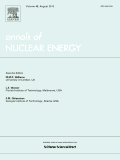
ANNALS OF NUCLEAR ENERGY
Shaping the Future of Sustainable Energy SystemsANNALS OF NUCLEAR ENERGY, published by Pergamon-Elsevier Science Ltd, is a premier interdisciplinary journal in the field of nuclear energy and engineering. Holding an impressive Q1 ranking in its category as per the 2023 evaluations, it is recognized for its significant contributions to the advancement of nuclear science and technology. With its extensive publication history since 1975 and a convergence period extending to 2025, the journal aims to disseminate high-quality research, innovative methodologies, and critical reviews that address the challenges and developments in nuclear energy systems. Though the journal does not offer open access options, it remains a vital resource for researchers, professionals, and students seeking to stay abreast of the latest trends and breakthroughs in this essential field. Its commitment to fostering academic discourse ensures that contributors and readers alike are engaged in shaping the future of energy solutions.
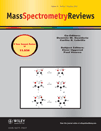
MASS SPECTROMETRY REVIEWS
Advancing the Frontiers of Mass SpectrometryMASS SPECTROMETRY REVIEWS, published by Wiley, is a premier academic journal dedicated to advancing the field of mass spectrometry and its applications across a multitude of scientific disciplines. With an ISSN of 0277-7037 and an E-ISSN of 1098-2787, the journal has established itself as a vital resource within the realms of Analytical Chemistry, Biochemistry, Genetics, Condensed Matter Physics, and Spectroscopy, achieving Q1 status across these categories in 2023. As a testament to its significant contribution to scholarly research, it boasts impressive Scopus rankings, including a rank of #2 out of 76 in Chemistry - Spectroscopy and #4 out of 156 in Chemistry - Analytical Chemistry, placing it in the 97th percentile and above. Emphasizing high-quality, peer-reviewed research, MASS SPECTROMETRY REVIEWS serves as an essential platform for researchers, professionals, and students aiming to stay abreast of cutting-edge developments and methodologies in mass spectrometry. The journal is committed to fostering a deeper understanding of mass spectrometric techniques while also contributing to interdisciplinary advancements, making it a valuable addition to any academic library. Authors seeking to disseminate their work in a journal with a strong reputation and impact in the scientific community will find MASS SPECTROMETRY REVIEWS an ideal venue.
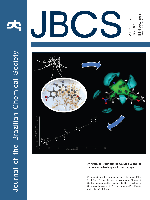
JOURNAL OF THE BRAZILIAN CHEMICAL SOCIETY
Innovating Chemistry: Where Brazilian Research Meets Global ImpactThe Journal of the Brazilian Chemical Society (ISSN: 0103-5053; E-ISSN: 1678-4790), published by the Sociedade Brasileira de Química, stands as a prominent outlet for disseminating high-quality research in the field of chemistry. Since its establishment as an Open Access journal in 1990, it has been committed to providing unrestricted access to innovative findings and discussions that propel the advancement of chemical sciences globally. Located in the vibrant research landscape of Brazil, this journal aims to showcase a wide range of topics including analytical, organic, inorganic, and physical chemistry, among others, catering to a diverse audience of researchers, professionals, and students alike. The journal holds a noteworthy distinction with a Q3 quartile ranking in the field of miscellaneous chemistry for 2023 and is indexed in Scopus, reflecting its growing influence in the academic community. With a publication cycle that spans continuously from 1990 through 2024, it serves as a vital resource for anyone seeking to stay informed about the latest trends and breakthroughs in chemistry.
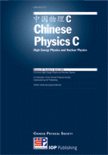
Chinese Physics C
Pioneering Research for Tomorrow's DiscoveriesChinese Physics C is a premier, peer-reviewed journal published by IOP Publishing Ltd, dedicated to advancing knowledge in the fields of Astronomy and Astrophysics, Instrumentation, and Nuclear and High Energy Physics. With an impressive impact factor reflecting its standing in the Q1 quartile across multiple categories, this journal serves as a vital resource for researchers, professionals, and students seeking to engage with cutting-edge developments and experimental findings. Since its inception in 2008, Chinese Physics C has fostered significant collaborations and discussions within the global physics community, enabling easy access to high-quality research through its open access options. Operating from the United Kingdom with a commitment to excellence, this journal not only showcases high-impact papers but also encourages innovative methodologies and interdisciplinary approaches, solidifying its role as an essential platform for dissemination and dialogue in the rapidly evolving landscape of physics.
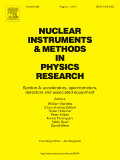
NUCLEAR INSTRUMENTS & METHODS IN PHYSICS RESEARCH SECTION A-ACCELERATORS SPECTROMETERS DETECTORS AND ASSOCIATED EQUIPMENT
Fostering collaboration in the realm of nuclear instrumentation advancements.NUCLEAR INSTRUMENTS & METHODS IN PHYSICS RESEARCH SECTION A is a leading journal published by Elsevier, dedicated to the advancements in accelerators, spectrometers, detectors, and associated equipment relevant to the fields of nuclear and high energy physics. With its ISSN 0168-9002 and E-ISSN 1872-9576, this journal fosters knowledge sharing among physicists and researchers globally, providing a critical platform for both theoretical and experimental studies. Currently ranked in the Q2 quartile for both Instrumentation and Nuclear and High Energy Physics, the journal maintains a robust position in the competitive Scopus rankings, with noteworthy placements that underline its scholarly impact. As of 2023, it occupies the 38th rank in Nuclear and High Energy Physics and the 79th in Instrumentation, illustrating its relevance in the scientific community. Covering research spanning from its inception in 1983 to the projected completion in 2024, the journal caters to a diverse audience of researchers, professionals, and students eager to stay abreast of the latest innovations and techniques in the realm of nuclear instrumentation. Although it primarily operates under subscription-based access, it is instrumental in disseminating pivotal findings and experimental methodologies that drive progress in the scientific community.
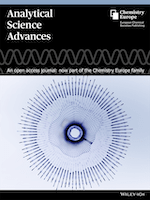
Analytical Science Advances
Pioneering Research for Tomorrow's Analytical ChallengesAnalytical Science Advances is a dynamic journal published by WILEY, dedicated to the ever-evolving field of analytical chemistry. With an ISSN of 2628-5452, this open-access platform aims to disseminate high-quality research and insightful reviews that push the boundaries of analytical methodologies and instrumentation. Since its inception in 2020, the journal has gained traction, securing a commendable Q2 ranking in 2023 within its category, highlighting its significance in the scientific community. Currently positioned at Rank #68 out of 156 in Scopus' analytical chemistry category, it boasts a 56th percentile ranking, reflecting its contributions to advancing analytical techniques. Researchers, professionals, and students will find this journal an invaluable resource for keeping abreast of the latest developments, emerging technologies, and innovative approaches in analytical science, ensuring the journal's relevancy and influence in shaping future discoveries.